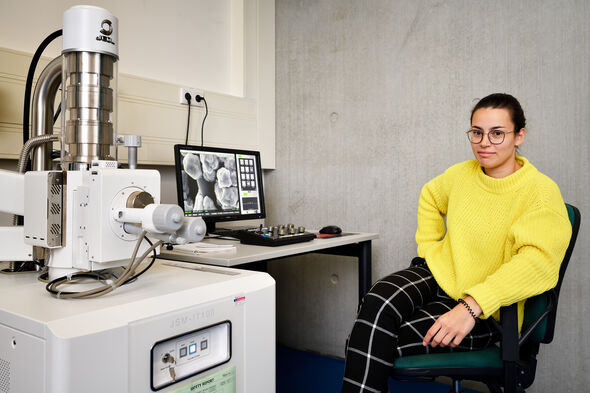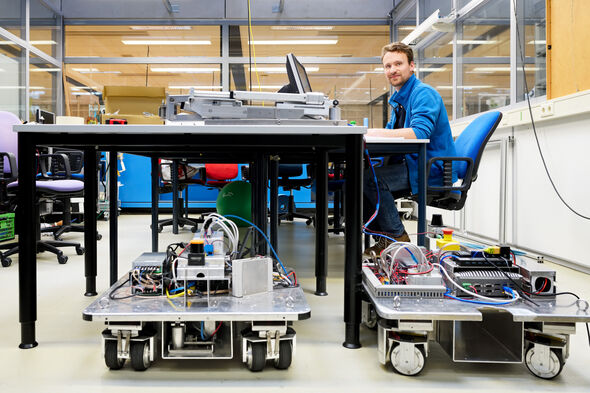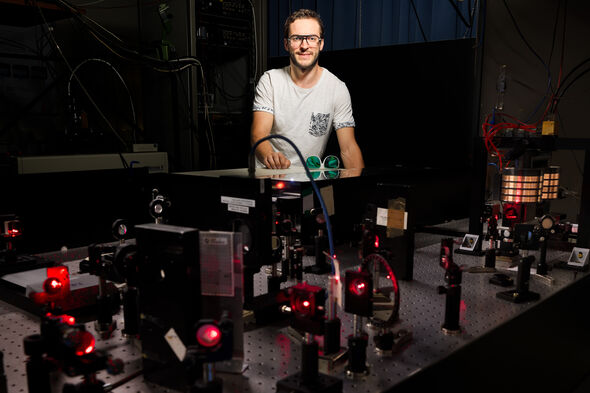
Back in the one-and-a-half-meter lab
Graduate students are working on their projects again
On June the 15th, TU/e reopened its laboratories for graduate students who were forced to abandon their experimental work due to the coronavirus. For three months, the lockdown prevented them from entering the lab. How has it affected their graduation? And how does that work: graduating in the one-and-a-half-meter lab?
Friday 13 March 2020 was an unlucky day indeed for many graduate students: on that day it was decided that due to the corona epidemic, the labs at TU/e would be closed effective immediately for all research, which the exception of the most necessary research projects. That meant that for at least the next two weeks, the labs were off-limits as well for students who conducted their graduation research there.
Those two weeks eventually became three months. Even though all other research restarted on 6 May - with all kinds of ifs and buts and in two shifts a day -, the students had to wait a bit longer before they could finally resume the concluding phase of their studies.
Cursor spoke to a few students about graduating during lockdown, returning to the lab, and the possible consequences for their future.
“The morning shift is rough; I’m a bit of a night owl”
Yvette van Beek’s midterm assessment had just taken place when the university closed, she says. “I had just received feedback and was about to continue with my research and was ready to improve things and expand.” She deliberately chose not to supplement her thesis with making a model, Yvette explains. “That would have been possible in principle, in which case I would have been finished according to planning in May. But I wanted to develop myself by conducting experiments in the lab.”
She nevertheless spent her time usefully, Yvette emphasizes. “In hindsight I could have even taken extra courses if I had known how long the lockdown would last. Instead, I’ve conducted additional literate review to better understand the theory of electrochemistry.”
Yvette graduates in the Membrane Materials & Processes group, where she examines porous electrodes for so-called redox flow batteries, which could be used for temporary storage of wind and solar energy in particular. “I investigate metal electrodes as well as electrodes based on graphite.”
The chemistry student is now back in the lab every day; during the morning shift from 7:00 until 13:00 hrs. “That’s quite rough, because I’m a bit of a night owl. But it works really well, because this way I have to get up early and I still have the entire afternoon to process the data from the experiments.” She is glad that she no longer has to work from home all the time, she says. “Fortunately, I’m surrounded by people again here, such as my supervisor, with whom I can talk about my work. That motivates me more than sitting behind my computer at home.”
Here, I can talk with people about my graduate work; that motivates me more than sitting behind my computer at home
The corona measures in the lab are very visible in the Helix building, she says: “There are disinfectant hand gel dispensers everywhere, there are notes on the doors indicating how many people are allowed in the lab at the same time, and lines were placed on the floor making it easier for people to maintain proper distance. There are shower curtains between the desks in the office so that several PhD students can safely sit there at the same time. Everything is well organized, I think.”
For now, Yvette’s final presentation is planned for August. However, she will not be finished with her program by that time: she will start with her mandatory traineeship in September. “It was uncertain for a while whether that would be possible, because many companies don’t want to offer a guarantee at this point that they can welcome a trainee. Company internships usually last four to six months at our program, which means that it will be difficult to graduate before the end of January. Only if I manage that do I get a three-month tuition refund as compensation for delay suffered due to the corona crisis.” That arrangement seems rather illogical to her. “Many students will miss out on support in the near future, even though they most certainly suffered delay due to the corona crisis.”
“I now have more than enough space to move around hospital beds”
Lex van Dommelen graduates in the Control Systems Technology group (department of Mechanical Engineering) and works on a robot platform meant for the transportation of hospital beds. “The idea is that health care personnel will no longer have to push the beds,” he explains. “In first instance a controller could be used, but in the long run transportation of beds has to take place fully autonomously.” This means that the platform needs to take into account people and objects as it moves through the hospital corridors.
That’s quite a serious challenge, Lex admits. “My graduation work is a small part of that. The platform has eight wheels and once you connect it to a heavy hospital bed, these wheels tend to slip. To prevent this, I’m working on a kind of ABS system, like the ones in cars. Without the robot knowing in advance how heavy the bed is, it shouldn’t slip anymore because of this. And I hope to get the robot to estimate how fast it can drive without having too long a breaking distance.”
Lex had just started with the second phase of his project when the labs closed. “My research proposal had just been approved,” he says. After he was no longer allowed access to the robotics labs on the ground floor of Gemini Noord, where Tech United’s soccer pitch is located as well, he first made models of his system at home. “I then figured out how I could validate these models, but after that I was a bit less productive for a few weeks. I’m currently validating the models.”
It’s nice and quiet in the robotics lab, the graduate student says. “Instead of twenty people, there are currently only three of us in the lab most of the time, including the PhD student who supervises me, fortunately. The rest can continue with their work from home. That means I have ample space for my tests; that’s really an ideal situation, because we use an actual hospital bed for it. I’ll be taking it out of storage again soon.”
We officially requested whether we could cut off the walking route to the toilets and coffee machine
Despite the fact that the lab is practically empty, the corona measures are taken seriously. “At first the walking routes were strictly enforced also, but once you get to the soccer pitch you need to go against the walking route for one meter to get to the toilets and the coffee machine. Since there are so few of us, it seemed rather pointless to take a detour for that. But we nevertheless officially requested whether we could walk past that. Fortunately, we were granted permission.”
Lex, who enrolled in the Master’s program Systems and Control after graduating from the HTS, hopes to have completed his studies in late September. That is why he works longer days now to compensate for lost time. That’s not a problem at all because there’s no need to work in shifts in the practically empty lab. Apart perhaps from a short, one-week vacation, he too will spend the whole summer working. “I’ve been working on my Master’s long enough, so I hope I won’t suffer a delay anymore now.”
“I can’t just knock on my supervisor’s office door”
Maarten Peters started with his graduation project in the group Physics of Nanostructures (FNA) in late January. The project started with literature study for a week, followed by a practical training in the lab in the Cascade building, he says. “Just when I was about to start with my experiment, we had to leave the lab. I then started to run simulations at home using a model a PhD student in the group was already working on. Fortunately, I could start to work on that right away.” It seems that the outcomes of Maarten’s computer simulations are of use for his experimental work in the lab, he says. “Based on the simulations I still want to try a few things I otherwise might not have done.”
For his graduation, Maarten focuses on a method for recording information in magnetic materials using laser pulses. “My supervisor, PhD student Youri van Hees, has demonstrated that an extra layer of material helps to write data in a deterministic way using this method. The plan is that I’m going to investigate how that works exactly.” Even though his simulations aren’t completely finished yet, Maarten did go back to lab the moment it was allowed again. “We spent the first two weeks getting the set-up operating again; I started with the measurements last week.”
A maximum of five people are allowed in the lab simultaneously, provided that they’re not working on the same set-up
Although researchers in the FNA group work in shifts as a basic rule, the lab is so quiet now that most days Maarten can simply continue with his work after his morning shift has ended. “A maximum of five people are allowed in the lab simultaneously, provided that they’re not working on the same set-up. Since Youri and I are the only ones working with this set-up, I can work whole days when Youri doesn’t have to be in the lab.” Even though they’re not allowed to actually work together, his supervisor can observe when necessary - there’s room enough for that around the optic table. It does need to be planned though. “Everyone who doesn’t need to be in the lab still works from home, so I can’t just knock on Youri’s office door to ask him to take a look. But fortunately, he’s easy to reach as far as all else is concerned.”
All in all, things are quiet in and around the labs in the Cascade building, Maarten says. “There is one other experimental graduate student in the group, and three more who do theoretical work from home." Enjoying a cup of coffee or a lunch together isn’t an option unfortunately. “We tried that via Microsoft Teams, but it’s just not the same.” He doesn’t believe to have suffered delay due to the corona crisis. “It seems that my simulation work can become part of my thesis. And I still have until the end of this year for the experiments.”




Discussion